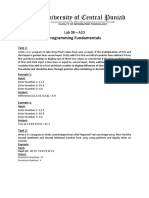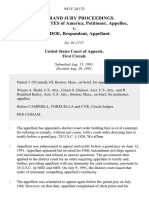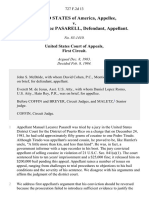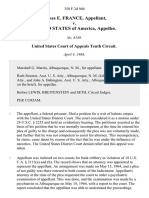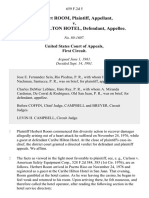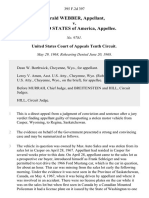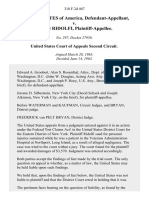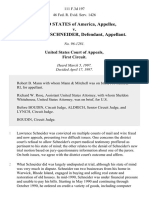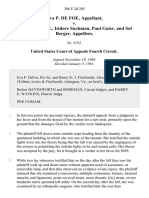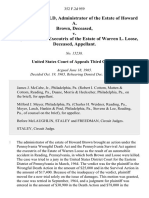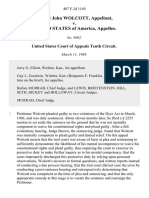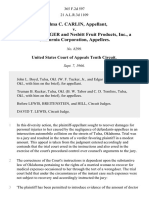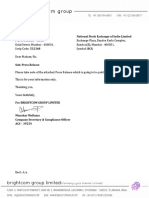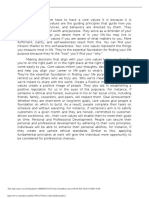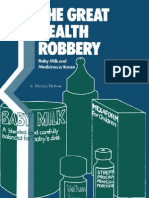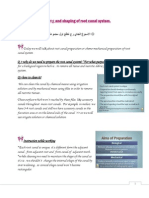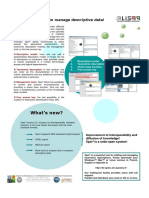Paul A. Hoff v. United States, 268 F.2d 646, 10th Cir. (1959)
Paul A. Hoff v. United States, 268 F.2d 646, 10th Cir. (1959)
Uploaded by
Scribd Government DocsCopyright:
Available Formats
Paul A. Hoff v. United States, 268 F.2d 646, 10th Cir. (1959)
Paul A. Hoff v. United States, 268 F.2d 646, 10th Cir. (1959)
Uploaded by
Scribd Government DocsOriginal Description:
Copyright
Available Formats
Share this document
Did you find this document useful?
Is this content inappropriate?
Copyright:
Available Formats
Paul A. Hoff v. United States, 268 F.2d 646, 10th Cir. (1959)
Paul A. Hoff v. United States, 268 F.2d 646, 10th Cir. (1959)
Uploaded by
Scribd Government DocsCopyright:
Available Formats
268 F.
2d 646
Paul A. HOFF, Appellant,
v.
UNITED STATES of America, Appellee.
No. 5994.
United States Court of Appeals Tenth Circuit.
July 8, 1959.
Harry H. Peterson, Minneapolis, Minn., for appellant.
Ruth C. Streeter, Asst. U.S. Atty., Albuquerque, N.M. (James A. Borland,
U.S. Atty., Albuquerque, N.M., was with her on the brief), for appellee.
Before BRATTON, Chief Judge, and HUXMAN and LEWIS, Circuit
Judges.
HUXMAN, Circuit Judge.
This was an action brought by appellant, Paul A. Hoff, against the United
States to recover damages resulting from a collision of an airplane operated by
an agent of the Government with an automobile in which appellant was seated
at the time of the accident. It was instituted under the Federal Tort Claims Act,
28 U.S.C.A. 2674. Trial was had to the court. The court found the Government
guilty of negligence and entered a judgment of $4,000 in favor of appellant.
Since the court's finding that the Government's agent was guilty of negligence,
imposing liability on the Government, is not challenged, it is not necessary to
set out the facts which caused the collision.
The only assignment urged for reversal is the gross inadequacy of the
judgment. The parties are in agreement as to the applicable principles of law
governing an appellate court reviewing a judgment when the assertion is that
the judgment is grossly inadequate. It is therefore not necessary to cite
numerous authorities. It may be stated generally that the findings of the trial
court will not be set aside unless clearly erroneous and grossly inadequate.1
The trial judge made no detailed findings of fact. He entered a memorandum in
the form of an opinion. In this he found that damage to the car was $1,265.
With respect to the remaining damages, he found, 'With the exception of
$1,265.00, damage to the car, I shall not attempt to specify different items of
damage I have considered. There was some medical expense. There were some
minor injuries sustained by plaintiff, for which he should be compensated. I
expressly find there was no permanent injury attributable to this accident.'
Appellant's contention that after allowing $1,265 for damages to the car, the
court allowed $2,515.56 for doctor bills and that there then remained only
$219.44 for personal injuries, is not sustained by the record. The court did not
find that the doctor bills, chargeable to the Government, totalled $2,515.56. All
the court found was, 'There was some medical expense.' How much the court,
in fact, awarded for medical expense, cannot be ascertained from the record.
What the court found was that the difference between $4,000 and $1,265 would
be adequate compensation for all other damages suffered, such as medical
expense and what minor injuries he found appellant had incurred. In the
absence of a request for itemized findings of fact with respect to medical
expenses and personal injuries by appellant, he will not be heard to complain
about a general finding.2
The court's finding that $4,000 was adequate damages for all loss suffered can
be challenged successfully only if it must be said, as a matter of law, that its
finding that there were only some minor injuries and that there was no
permanent injury attributable to this accident, finds no support in the record. It
is without dispute that there was no outward or pathological evidence of any
physical injury or any injury that could be specifically catalogued. Appellant
offered the testimony of two doctors, Dr. Fitzpatrick and Dr. Ross. Dr.
Fitzpatrick testified that appellant suffered a whiplash of the spine. He said that
it could not be disclosed or proved by X-rays and sometimes not even by
neurological examinations. Whatever it is, it affects the spine. He testified that
it can be established by symptoms alone and just knowing the individual. He
further testified if what appellant told him was true, that he had never had any
other injury, then, in his opinion, this injury was the result of this accident. Dr.
Ross, a psychiatrist, testified that appellant had a posttraumatic neurosis which
was caused by his reaction to the crash while he was in the automobile. Both
Dr. Fitzpatrick and Dr. Ross testified that in their opinion appellant was totally
disabled from doing any kind of work.
Dr. Schultz and Dr. Corcoran testified for the Government. Dr. Schultz, an
orthopedist, found no exterior or pathological evidence of injury, but he did find
that appellant had a limp for which the doctor could give no apparent reason.
Dr. Corcoran testified that he was a dermatologist and not a psychiatrist and
that he could find no evidence of broken glass in appellant's skin. He further
testified that it was a case of neuro-dermatitis, and that this stemmed from
neurosis or psychosis, practically always of long standing.
7
That appellant was psycho-neurotic and that this condition had been of long
standing, is without dispute in the record. How much of this, if any, was
directly or proximately caused by this accident is not at all clear in the record.
Dr. Ross also testified that appellant had a post-traumatic neurosis which was
caused by his reaction to the crash.
It is contended that since Dr. Ross was the only psychiatrist, the court erred, as
a matter of law, in rejecting his testimony that the psycho-neurotic injuries from
which appellant is suffering was a result of this accident. The court considered
Dr. Ross's testimony. The court was, however, not required to accept Dr. Ross's
conclusion that the psycho-neurotic injury was the result of the accident.
Whether it was, was a question of fact which the court was required to find, and
under all the facts of the case, the court was not required to accept Dr. Ross's
conclusion as to the cause of appellant's present condition. Neither is it correct
to say that there is no other evidence in the record on this question. Dr.
Corcoran was a dermatologist, and as such he testified that, in his opinion, the
appellant was suffering from a neuro-dermatitis condition. He further testified
that while he was not a psychiatrist, he made the statement 'without any
equivocation at all, that I believe, without a doubt, this is a neuro-dermatitis,
and it is a positive fact that all neuro-dermatitis stems from a neurosis or
psychosis, practically always of long standing. In an indirect way I make that
statement.'
Without delving further into a detailed discussion of the testimony of the four
doctors, it is sufficient to say that we cannot say, as a matter of law. from an
examination of the evidence that the court's finding that there was no
permanent injury nor more than some minor injuries attributable to the accident
is so clearly erroneous as to require reversal.
10
Affirmed.
Employers' Liability Assurance Corp. v. Freeman, 10 Cir., 229 F.2d 547; Rule
52(a) F.R.Civ.P., 28 U.S.C.A
Sonken-Galamba Corp. v. Atchison, T. & S.F. Ry. Co., D.C., 34 F.Supp. 15
You might also like
- Nevada Reports 1960 (76 Nev.) PDFDocument406 pagesNevada Reports 1960 (76 Nev.) PDFthadzigsNo ratings yet
- Publish United States Court of Appeals For The Tenth CircuitDocument10 pagesPublish United States Court of Appeals For The Tenth CircuitScribd Government Docs100% (1)
- Programming Fundamentals: Lab 08 - A10Document3 pagesProgramming Fundamentals: Lab 08 - A10HammadNo ratings yet
- Jessie Frances Davis v. United States, 364 F.2d 572, 10th Cir. (1966)Document3 pagesJessie Frances Davis v. United States, 364 F.2d 572, 10th Cir. (1966)Scribd Government DocsNo ratings yet
- In Re Grand Jury Proceedings. United States of America v. John Doe, 943 F.2d 132, 1st Cir. (1991)Document8 pagesIn Re Grand Jury Proceedings. United States of America v. John Doe, 943 F.2d 132, 1st Cir. (1991)Scribd Government DocsNo ratings yet
- Hess Crossland v. Continental Casualty Company, A Foreign Corporation, 374 F.2d 586, 10th Cir. (1967)Document5 pagesHess Crossland v. Continental Casualty Company, A Foreign Corporation, 374 F.2d 586, 10th Cir. (1967)Scribd Government DocsNo ratings yet
- Thomas O'COnnOr v. Venore Transportation Company, 353 F.2d 324, 1st Cir. (1965)Document4 pagesThomas O'COnnOr v. Venore Transportation Company, 353 F.2d 324, 1st Cir. (1965)Scribd Government DocsNo ratings yet
- United States v. Manuel Lecaroz Pasarell, 727 F.2d 13, 1st Cir. (1984)Document7 pagesUnited States v. Manuel Lecaroz Pasarell, 727 F.2d 13, 1st Cir. (1984)Scribd Government DocsNo ratings yet
- Joseph A. D'AmbrA v. United States of America, Joseph A. D'AmbrA v. United States, 518 F.2d 275, 1st Cir. (1975)Document4 pagesJoseph A. D'AmbrA v. United States of America, Joseph A. D'AmbrA v. United States, 518 F.2d 275, 1st Cir. (1975)Scribd Government DocsNo ratings yet
- Ernest J. Hendry v. United States, 418 F.2d 774, 2d Cir. (1969)Document13 pagesErnest J. Hendry v. United States, 418 F.2d 774, 2d Cir. (1969)Scribd Government DocsNo ratings yet
- John W. Gardner, Secretary of Health, Education and Welfare v. Butler O. Bishop, 362 F.2d 917, 10th Cir. (1966)Document4 pagesJohn W. Gardner, Secretary of Health, Education and Welfare v. Butler O. Bishop, 362 F.2d 917, 10th Cir. (1966)Scribd Government DocsNo ratings yet
- Todosio Casias and Dorothy Casias v. United States, 532 F.2d 1339, 10th Cir. (1976)Document4 pagesTodosio Casias and Dorothy Casias v. United States, 532 F.2d 1339, 10th Cir. (1976)Scribd Government DocsNo ratings yet
- United States v. Saver Hodge-Balwing A/K/A Balwin Hodge, 952 F.2d 607, 1st Cir. (1991)Document6 pagesUnited States v. Saver Hodge-Balwing A/K/A Balwin Hodge, 952 F.2d 607, 1st Cir. (1991)Scribd Government DocsNo ratings yet
- United States v. Earl S. Baird, 414 F.2d 700, 2d Cir. (1969)Document18 pagesUnited States v. Earl S. Baird, 414 F.2d 700, 2d Cir. (1969)Scribd Government DocsNo ratings yet
- Zdenka Chnapkova, Also Known As Denis Chnoupek v. Kong S. Koh, M.D., United States Court of Appeals, Second Circuit, 985 F.2d 79, 2d Cir. (1993)Document6 pagesZdenka Chnapkova, Also Known As Denis Chnoupek v. Kong S. Koh, M.D., United States Court of Appeals, Second Circuit, 985 F.2d 79, 2d Cir. (1993)Scribd Government DocsNo ratings yet
- James E. France v. United States, 358 F.2d 946, 10th Cir. (1966)Document4 pagesJames E. France v. United States, 358 F.2d 946, 10th Cir. (1966)Scribd Government DocsNo ratings yet
- Claudia Lajean Whalley v. Chester Y. Sakura, JR., M.D., 804 F.2d 580, 10th Cir. (1986)Document11 pagesClaudia Lajean Whalley v. Chester Y. Sakura, JR., M.D., 804 F.2d 580, 10th Cir. (1986)Scribd Government DocsNo ratings yet
- Hampton Roads Stevedoring Corporation v. O'Hearne, 184 F.2d 76, 4th Cir. (1950)Document7 pagesHampton Roads Stevedoring Corporation v. O'Hearne, 184 F.2d 76, 4th Cir. (1950)Scribd Government DocsNo ratings yet
- Herbert Room v. Caribe Hilton Hotel, 659 F.2d 5, 1st Cir. (1981)Document5 pagesHerbert Room v. Caribe Hilton Hotel, 659 F.2d 5, 1st Cir. (1981)Scribd Government DocsNo ratings yet
- Joan Subecz v. David M. Curtis, 483 F.2d 263, 1st Cir. (1973)Document7 pagesJoan Subecz v. David M. Curtis, 483 F.2d 263, 1st Cir. (1973)Scribd Government DocsNo ratings yet
- United States Court of Appeals Fourth CircuitDocument5 pagesUnited States Court of Appeals Fourth CircuitScribd Government DocsNo ratings yet
- Lonnie Joe Dutton v. John N. Brown and Attorney General of The State of Oklahoma, 788 F.2d 669, 10th Cir. (1986)Document9 pagesLonnie Joe Dutton v. John N. Brown and Attorney General of The State of Oklahoma, 788 F.2d 669, 10th Cir. (1986)Scribd Government DocsNo ratings yet
- Helen C. Wright v. American Home Assurance Company, 488 F.2d 361, 10th Cir. (1974)Document5 pagesHelen C. Wright v. American Home Assurance Company, 488 F.2d 361, 10th Cir. (1974)Scribd Government DocsNo ratings yet
- James L. Otney v. United States, 340 F.2d 696, 10th Cir. (1965)Document8 pagesJames L. Otney v. United States, 340 F.2d 696, 10th Cir. (1965)Scribd Government DocsNo ratings yet
- Wilma F. Gundy v. United States, 728 F.2d 484, 10th Cir. (1984)Document7 pagesWilma F. Gundy v. United States, 728 F.2d 484, 10th Cir. (1984)Scribd Government DocsNo ratings yet
- Kelly E. Johnson v. Mississippi Valley Barge Line Company, 335 F.2d 904, 3rd Cir. (1964)Document6 pagesKelly E. Johnson v. Mississippi Valley Barge Line Company, 335 F.2d 904, 3rd Cir. (1964)Scribd Government DocsNo ratings yet
- United States v. Joseph Thomas Manley, 893 F.2d 1221, 11th Cir. (1990)Document6 pagesUnited States v. Joseph Thomas Manley, 893 F.2d 1221, 11th Cir. (1990)Scribd Government DocsNo ratings yet
- Martin Amador Beltran v. United States of America, (Three Cases), 302 F.2d 48, 1st Cir. (1962)Document8 pagesMartin Amador Beltran v. United States of America, (Three Cases), 302 F.2d 48, 1st Cir. (1962)Scribd Government DocsNo ratings yet
- United States v. Bert Glenn Munz, 504 F.2d 1203, 10th Cir. (1974)Document9 pagesUnited States v. Bert Glenn Munz, 504 F.2d 1203, 10th Cir. (1974)Scribd Government DocsNo ratings yet
- Gerald Webber v. United States, 395 F.2d 397, 10th Cir. (1968)Document5 pagesGerald Webber v. United States, 395 F.2d 397, 10th Cir. (1968)Scribd Government DocsNo ratings yet
- John Dougherty, in No. 12678 v. Waterman Steamship Corporation, (Ryan Stevedoring Company, in No. 12679), 265 F.2d 284, 3rd Cir. (1959)Document9 pagesJohn Dougherty, in No. 12678 v. Waterman Steamship Corporation, (Ryan Stevedoring Company, in No. 12679), 265 F.2d 284, 3rd Cir. (1959)Scribd Government DocsNo ratings yet
- Juan Parrilla-Lopez v. United States, 841 F.2d 16, 1st Cir. (1988)Document6 pagesJuan Parrilla-Lopez v. United States, 841 F.2d 16, 1st Cir. (1988)Scribd Government DocsNo ratings yet
- Samuel Freifield, Administrator of The Estate of Gerald R. McFall JR., Deceased v. John E. Hennessy, 353 F.2d 97, 3rd Cir. (1965)Document6 pagesSamuel Freifield, Administrator of The Estate of Gerald R. McFall JR., Deceased v. John E. Hennessy, 353 F.2d 97, 3rd Cir. (1965)Scribd Government DocsNo ratings yet
- William N. Stone v. Robert H. Finch, Secretary of Health, Education, and Welfare, 434 F.2d 364, 4th Cir. (1970)Document5 pagesWilliam N. Stone v. Robert H. Finch, Secretary of Health, Education, and Welfare, 434 F.2d 364, 4th Cir. (1970)Scribd Government DocsNo ratings yet
- Charles G. Rhodes v. United States, 282 F.2d 59, 4th Cir. (1960)Document6 pagesCharles G. Rhodes v. United States, 282 F.2d 59, 4th Cir. (1960)Scribd Government DocsNo ratings yet
- United States v. Robert Ridolfi, 318 F.2d 467, 2d Cir. (1963)Document6 pagesUnited States v. Robert Ridolfi, 318 F.2d 467, 2d Cir. (1963)Scribd Government DocsNo ratings yet
- Billy Glen Isley v. Richard L. Dugger, 877 F.2d 47, 11th Cir. (1989)Document5 pagesBilly Glen Isley v. Richard L. Dugger, 877 F.2d 47, 11th Cir. (1989)Scribd Government DocsNo ratings yet
- United States v. Anthony Caviness, 931 F.2d 887, 4th Cir. (1991)Document5 pagesUnited States v. Anthony Caviness, 931 F.2d 887, 4th Cir. (1991)Scribd Government DocsNo ratings yet
- Donald Moody v. Maine Central Railroad Company, 823 F.2d 693, 1st Cir. (1987)Document6 pagesDonald Moody v. Maine Central Railroad Company, 823 F.2d 693, 1st Cir. (1987)Scribd Government DocsNo ratings yet
- United States v. Schneider, 111 F.3d 197, 1st Cir. (1997)Document11 pagesUnited States v. Schneider, 111 F.3d 197, 1st Cir. (1997)Scribd Government DocsNo ratings yet
- Eva P. de Foe v. Benjamin Duhl, Isidore Suchman, Paul Gaier, and Sol Berger, 286 F.2d 205, 4th Cir. (1961)Document5 pagesEva P. de Foe v. Benjamin Duhl, Isidore Suchman, Paul Gaier, and Sol Berger, 286 F.2d 205, 4th Cir. (1961)Scribd Government DocsNo ratings yet
- Carl Branciforte, Leesburg Institute, Inc., T/a Springwood Psychiatric Inst., and C. Gibson Dunn, DR., Dr. John P. Snead, Dr. Christopher Snyder, Iii, Dr. Ronald Garson, 814 F.2d 655, 4th Cir. (1987)Document3 pagesCarl Branciforte, Leesburg Institute, Inc., T/a Springwood Psychiatric Inst., and C. Gibson Dunn, DR., Dr. John P. Snead, Dr. Christopher Snyder, Iii, Dr. Ronald Garson, 814 F.2d 655, 4th Cir. (1987)Scribd Government DocsNo ratings yet
- Lynch v. Overholser, 369 U.S. 705 (1962)Document22 pagesLynch v. Overholser, 369 U.S. 705 (1962)Scribd Government DocsNo ratings yet
- Carolyn Hurley, Individually, and As Parent and Guardian of James T. McNey v. United States of America Clinical Data, Inc., A Delaware Corporation, 923 F.2d 1091, 4th Cir. (1991)Document14 pagesCarolyn Hurley, Individually, and As Parent and Guardian of James T. McNey v. United States of America Clinical Data, Inc., A Delaware Corporation, 923 F.2d 1091, 4th Cir. (1991)Scribd Government DocsNo ratings yet
- Scott Lewis Crandell, Linda Marie Crandell, Jennifer Jammeson Crandell, As Infant Who Sues by Her Mother and Next Friend Linda Marie Crandell v. United States, 703 F.2d 74, 4th Cir. (1983)Document10 pagesScott Lewis Crandell, Linda Marie Crandell, Jennifer Jammeson Crandell, As Infant Who Sues by Her Mother and Next Friend Linda Marie Crandell v. United States, 703 F.2d 74, 4th Cir. (1983)Scribd Government DocsNo ratings yet
- United States v. Matthew Wayne Tome, 61 F.3d 1446, 10th Cir. (1995)Document20 pagesUnited States v. Matthew Wayne Tome, 61 F.3d 1446, 10th Cir. (1995)Scribd Government DocsNo ratings yet
- Edward Dvorak, Sr. v. Anthony J. Celebrezze, Secretary of Health, Education and Welfare, 345 F.2d 894, 10th Cir. (1965)Document4 pagesEdward Dvorak, Sr. v. Anthony J. Celebrezze, Secretary of Health, Education and Welfare, 345 F.2d 894, 10th Cir. (1965)Scribd Government DocsNo ratings yet
- Gillis v. United States, 16 F.3d 401, 1st Cir. (1993)Document5 pagesGillis v. United States, 16 F.3d 401, 1st Cir. (1993)Scribd Government DocsNo ratings yet
- Kramer D. Arnold, Administrator of The Estate of Howard A. Brown, Deceased v. Emily F. Loose, of The Estate of Warren L. Loose, Deceased, 352 F.2d 959, 3rd Cir. (1965)Document15 pagesKramer D. Arnold, Administrator of The Estate of Howard A. Brown, Deceased v. Emily F. Loose, of The Estate of Warren L. Loose, Deceased, 352 F.2d 959, 3rd Cir. (1965)Scribd Government DocsNo ratings yet
- Charles M. Laws v. Anthony J. Celebrezze, Secretary of Health, Education and Welfare, 368 F.2d 640, 4th Cir. (1966)Document6 pagesCharles M. Laws v. Anthony J. Celebrezze, Secretary of Health, Education and Welfare, 368 F.2d 640, 4th Cir. (1966)Scribd Government DocsNo ratings yet
- Charles William Proffitt v. Louie L. Wainwright, Secretary, Florida Department of Offender Rehabilitation, 685 F.2d 1227, 11th Cir. (1982)Document63 pagesCharles William Proffitt v. Louie L. Wainwright, Secretary, Florida Department of Offender Rehabilitation, 685 F.2d 1227, 11th Cir. (1982)Scribd Government DocsNo ratings yet
- John Turner, Warden, Utah State Prison v. Fay Ward, JR., 321 F.2d 918, 10th Cir. (1963)Document5 pagesJohn Turner, Warden, Utah State Prison v. Fay Ward, JR., 321 F.2d 918, 10th Cir. (1963)Scribd Government DocsNo ratings yet
- May L. Hayes v. John W. Gardner, Secretary of Health, Education and Welfare, 376 F.2d 517, 4th Cir. (1967)Document6 pagesMay L. Hayes v. John W. Gardner, Secretary of Health, Education and Welfare, 376 F.2d 517, 4th Cir. (1967)Scribd Government DocsNo ratings yet
- Jack K. Bewley, of The Estate of W. E. Bewley, Deceased v. American Home Assurance Company, Merle E. Bewley v. Associated Indemnity Corporation, 450 F.2d 1079, 10th Cir. (1971)Document5 pagesJack K. Bewley, of The Estate of W. E. Bewley, Deceased v. American Home Assurance Company, Merle E. Bewley v. Associated Indemnity Corporation, 450 F.2d 1079, 10th Cir. (1971)Scribd Government DocsNo ratings yet
- United States v. Shiva N. Varma, 691 F.2d 460, 10th Cir. (1982)Document6 pagesUnited States v. Shiva N. Varma, 691 F.2d 460, 10th Cir. (1982)Scribd Government DocsNo ratings yet
- United States v. Joseph Albert Pelletier, 845 F.2d 1126, 1st Cir. (1988)Document7 pagesUnited States v. Joseph Albert Pelletier, 845 F.2d 1126, 1st Cir. (1988)Scribd Government DocsNo ratings yet
- Page Flooring and Construction Co. v. Nationwide Life Insurance Co., 840 F.2d 159, 1st Cir. (1988)Document4 pagesPage Flooring and Construction Co. v. Nationwide Life Insurance Co., 840 F.2d 159, 1st Cir. (1988)Scribd Government DocsNo ratings yet
- Powell v. Texas, 392 U.S. 514 (1968)Document41 pagesPowell v. Texas, 392 U.S. 514 (1968)Scribd Government DocsNo ratings yet
- Robert John Wolcott v. United States, 407 F.2d 1149, 10th Cir. (1969)Document10 pagesRobert John Wolcott v. United States, 407 F.2d 1149, 10th Cir. (1969)Scribd Government DocsNo ratings yet
- Lyskoski T. Washington v. Gershon Silber, Doctor, G. E. Deans, 993 F.2d 1541, 4th Cir. (1993)Document6 pagesLyskoski T. Washington v. Gershon Silber, Doctor, G. E. Deans, 993 F.2d 1541, 4th Cir. (1993)Scribd Government DocsNo ratings yet
- Thelma C. Carlin v. John T. Stringer and Nesbitt Fruit Products, Inc., A California Corporation, 365 F.2d 597, 10th Cir. (1966)Document3 pagesThelma C. Carlin v. John T. Stringer and Nesbitt Fruit Products, Inc., A California Corporation, 365 F.2d 597, 10th Cir. (1966)Scribd Government DocsNo ratings yet
- United States v. Kieffer, 10th Cir. (2017)Document20 pagesUnited States v. Kieffer, 10th Cir. (2017)Scribd Government DocsNo ratings yet
- United States v. Olden, 10th Cir. (2017)Document4 pagesUnited States v. Olden, 10th Cir. (2017)Scribd Government DocsNo ratings yet
- Apodaca v. Raemisch, 10th Cir. (2017)Document15 pagesApodaca v. Raemisch, 10th Cir. (2017)Scribd Government DocsNo ratings yet
- United States v. Garcia-Damian, 10th Cir. (2017)Document9 pagesUnited States v. Garcia-Damian, 10th Cir. (2017)Scribd Government Docs100% (1)
- City of Albuquerque v. Soto Enterprises, 10th Cir. (2017)Document21 pagesCity of Albuquerque v. Soto Enterprises, 10th Cir. (2017)Scribd Government DocsNo ratings yet
- Consolidation Coal Company v. OWCP, 10th Cir. (2017)Document22 pagesConsolidation Coal Company v. OWCP, 10th Cir. (2017)Scribd Government DocsNo ratings yet
- Pecha v. Lake, 10th Cir. (2017)Document25 pagesPecha v. Lake, 10th Cir. (2017)Scribd Government DocsNo ratings yet
- Harte v. Board Comm'rs Cnty of Johnson, 10th Cir. (2017)Document100 pagesHarte v. Board Comm'rs Cnty of Johnson, 10th Cir. (2017)Scribd Government DocsNo ratings yet
- United States v. Voog, 10th Cir. (2017)Document5 pagesUnited States v. Voog, 10th Cir. (2017)Scribd Government DocsNo ratings yet
- United States v. Roberson, 10th Cir. (2017)Document50 pagesUnited States v. Roberson, 10th Cir. (2017)Scribd Government DocsNo ratings yet
- Publish United States Court of Appeals For The Tenth CircuitDocument24 pagesPublish United States Court of Appeals For The Tenth CircuitScribd Government DocsNo ratings yet
- United States v. Muhtorov, 10th Cir. (2017)Document15 pagesUnited States v. Muhtorov, 10th Cir. (2017)Scribd Government DocsNo ratings yet
- United States v. Kearn, 10th Cir. (2017)Document25 pagesUnited States v. Kearn, 10th Cir. (2017)Scribd Government DocsNo ratings yet
- Publish United States Court of Appeals For The Tenth CircuitDocument14 pagesPublish United States Court of Appeals For The Tenth CircuitScribd Government Docs100% (1)
- NM Off-Hwy Vehicle Alliance v. U.S. Forest Service, 10th Cir. (2017)Document9 pagesNM Off-Hwy Vehicle Alliance v. U.S. Forest Service, 10th Cir. (2017)Scribd Government DocsNo ratings yet
- United States v. Henderson, 10th Cir. (2017)Document2 pagesUnited States v. Henderson, 10th Cir. (2017)Scribd Government DocsNo ratings yet
- United States v. Windom, 10th Cir. (2017)Document25 pagesUnited States v. Windom, 10th Cir. (2017)Scribd Government DocsNo ratings yet
- Coburn v. Wilkinson, 10th Cir. (2017)Document9 pagesCoburn v. Wilkinson, 10th Cir. (2017)Scribd Government DocsNo ratings yet
- United States v. Kundo, 10th Cir. (2017)Document7 pagesUnited States v. Kundo, 10th Cir. (2017)Scribd Government DocsNo ratings yet
- Northern New Mexicans v. United States, 10th Cir. (2017)Document10 pagesNorthern New Mexicans v. United States, 10th Cir. (2017)Scribd Government DocsNo ratings yet
- Pledger v. Russell, 10th Cir. (2017)Document5 pagesPledger v. Russell, 10th Cir. (2017)Scribd Government DocsNo ratings yet
- United States v. Magnan, 10th Cir. (2017)Document27 pagesUnited States v. Magnan, 10th Cir. (2017)Scribd Government DocsNo ratings yet
- United States v. Magnan, 10th Cir. (2017)Document4 pagesUnited States v. Magnan, 10th Cir. (2017)Scribd Government DocsNo ratings yet
- Publish United States Court of Appeals For The Tenth CircuitDocument17 pagesPublish United States Court of Appeals For The Tenth CircuitScribd Government DocsNo ratings yet
- Robles v. United States, 10th Cir. (2017)Document5 pagesRobles v. United States, 10th Cir. (2017)Scribd Government DocsNo ratings yet
- Parker Excavating v. LaFarge West, 10th Cir. (2017)Document24 pagesParker Excavating v. LaFarge West, 10th Cir. (2017)Scribd Government DocsNo ratings yet
- United States v. Purify, 10th Cir. (2017)Document4 pagesUnited States v. Purify, 10th Cir. (2017)Scribd Government DocsNo ratings yet
- Chevron Mining v. United States, 10th Cir. (2017)Document42 pagesChevron Mining v. United States, 10th Cir. (2017)Scribd Government DocsNo ratings yet
- Jimenez v. Allbaugh, 10th Cir. (2017)Document5 pagesJimenez v. Allbaugh, 10th Cir. (2017)Scribd Government DocsNo ratings yet
- Entrepreneurship Development - May2011Document2 pagesEntrepreneurship Development - May2011puruaggarwalNo ratings yet
- UCS1412 - Database Lab Assignment - 3 NAME:Prakash R ROLL NO:185001108Document11 pagesUCS1412 - Database Lab Assignment - 3 NAME:Prakash R ROLL NO:185001108prakashNo ratings yet
- Genomic Analysis of Phylogroup D Assembly: Escherichia Coli Strains Using Novel De-Novo Reference-Based GuidedDocument9 pagesGenomic Analysis of Phylogroup D Assembly: Escherichia Coli Strains Using Novel De-Novo Reference-Based GuidedRecto SutismaNo ratings yet
- Brightcom Group - Appointment of Senior Management ProfessionalDocument4 pagesBrightcom Group - Appointment of Senior Management ProfessionalVivek AnandNo ratings yet
- People v. Dacudao, 170 SCRA 489Document4 pagesPeople v. Dacudao, 170 SCRA 489JNo ratings yet
- TMC Setup Guide Lab Table 20 SeriesDocument24 pagesTMC Setup Guide Lab Table 20 SeriesDiabloNo ratings yet
- Energies 11 01491Document41 pagesEnergies 11 01491GuiNo ratings yet
- Core Values ReflectionDocument1 pageCore Values ReflectionBozoma Saint JohnNo ratings yet
- Bibliography Published ThesisDocument5 pagesBibliography Published ThesisJames GupoNo ratings yet
- The Great Health RobberyDocument60 pagesThe Great Health RobberyOxfamNo ratings yet
- 9th English 1st Half Book Tests - Nauman SadafDocument27 pages9th English 1st Half Book Tests - Nauman SadafpeeralavaNo ratings yet
- SCR - 5 - Cleaning and Shaping of Root Canal System.Document12 pagesSCR - 5 - Cleaning and Shaping of Root Canal System.براءة أحمد السلاماتNo ratings yet
- Visit:: Join Telegram To Get Instant Updates: Contact: MAIL: Instagram: InstagramDocument157 pagesVisit:: Join Telegram To Get Instant Updates: Contact: MAIL: Instagram: InstagramAyush GhadoleNo ratings yet
- Architecture of (Vxworks) : Labview ProgramsDocument14 pagesArchitecture of (Vxworks) : Labview ProgramsRangaRaj100% (2)
- Guideline Xper2Document6 pagesGuideline Xper2Ivan AguilarNo ratings yet
- Pedagogy Assessment Key Stage 1Document49 pagesPedagogy Assessment Key Stage 1Dave SantosNo ratings yet
- Heron's Fountain: HydraulicsDocument10 pagesHeron's Fountain: HydraulicsIvanna MirandaNo ratings yet
- BEF AnalogyDocument9 pagesBEF Analogyvishal18mNo ratings yet
- Equios 202 194E 1Document12 pagesEquios 202 194E 1nzeeNo ratings yet
- Single Mode Optical Fiber Cable Specification: No. FT-S20104 Version:A Issued: Sept. 08, 2020Document4 pagesSingle Mode Optical Fiber Cable Specification: No. FT-S20104 Version:A Issued: Sept. 08, 2020Aung Thein OoNo ratings yet
- Present Simple Vs Present Continuous Worksheet Templates Layouts 46216Document26 pagesPresent Simple Vs Present Continuous Worksheet Templates Layouts 46216mrNo ratings yet
- English Paper I - Trial '10Document4 pagesEnglish Paper I - Trial '10Roshan P NairNo ratings yet
- Iphb Goa Recruitment 2021 Job NotificationDocument4 pagesIphb Goa Recruitment 2021 Job NotificationRajesh K KumarNo ratings yet
- Mep 946 SP-1Document3 pagesMep 946 SP-1RECAMBIOSYMAQUINASCOMNo ratings yet
- Sat - 23.Pdf - Handwritten Hindi Character Recognition Using CNNDocument11 pagesSat - 23.Pdf - Handwritten Hindi Character Recognition Using CNNVj KumarNo ratings yet
- Vital Statistics of The United States 1961 - Vol. 1 - Natality - PG 231 - Race and ColorDocument246 pagesVital Statistics of The United States 1961 - Vol. 1 - Natality - PG 231 - Race and ColorObamaRelease YourRecordsNo ratings yet
- Pub - High Brightness Light Emitting DiodesDocument489 pagesPub - High Brightness Light Emitting DiodesFernando Sánchez HernándezNo ratings yet
- Photoelectric Detector: Atsumielectric Co.,LtdDocument12 pagesPhotoelectric Detector: Atsumielectric Co.,LtdnastrapuleagraniceruNo ratings yet
- Etymology of Armenian LanguageDocument3 pagesEtymology of Armenian LanguageThriwNo ratings yet


